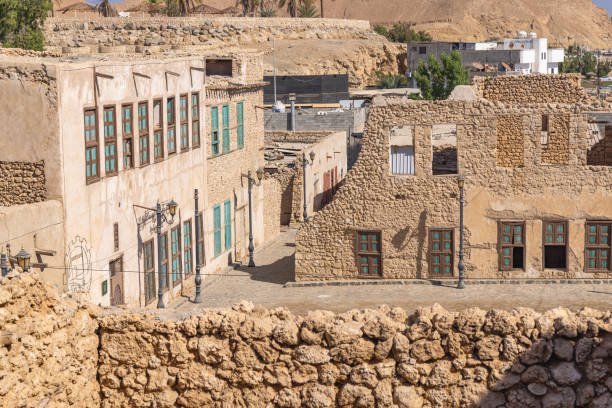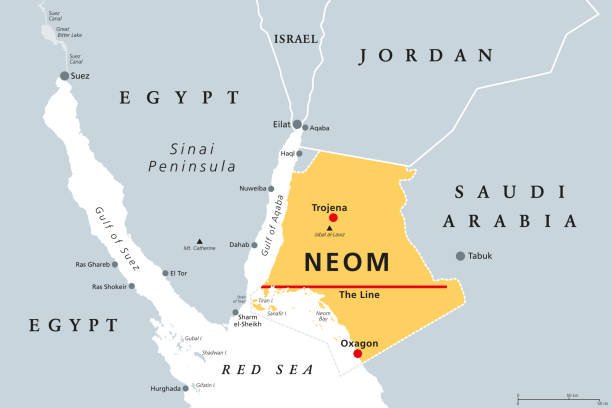Tabuk City, nestled in the far northwestern corner of Saudi Arabia, is one of the Kingdom’s hidden gems. As Saudi Arabia continues its Vision 2030 transformation, Tabuk is stepping into the spotlight as a region rich in history, natural beauty, and future potential.
From ancient ruins to modern megaprojects, from stunning deserts to beautiful coastlines, Tabuk embodies the old and new faces of Saudi Arabia.
This article takes a deep dive into Tabuk City, exploring its history, geography, economy, culture, tourism, and what the future holds for this fascinating city.
A Historical Glimpse into Tabuk City
Tabuk’s history dates back thousands of years, making it one of the oldest inhabited areas in the Arabian Peninsula.
It has been referenced in several ancient texts and maps, often serving as a significant waypoint for traders, pilgrims, and travelers.
Historically, Tabuk was part of the ancient trade route known as the Incense Route, which connected southern Arabia with the Mediterranean.
Tabuk is also closely linked with Islamic history. It was the site of the famous Expedition of Tabuk led by the Prophet Muhammad in 630 CE.
This event marked an important chapter in Islamic military history, and today, the site of the historic Tabuk Fortress stands as a testament to this rich legacy.
The fortress, preserved and open to visitors, provides insights into the traditional architecture and the city’s strategic importance over the centuries.
Geographical Features and Natural Beauty
Tabuk is characterized by a unique geographical setting that combines mountains, deserts, and coastal areas.
The city itself is located near the Red Sea and bordered by the Sarawat Mountains. This gives Tabuk a varied landscape that is both dramatic and beautiful.
The desert areas are home to striking rock formations and endless expanses of golden sands, while the coastal regions boast pristine beaches and coral reefs teeming with marine life.
One of the most iconic natural sites near Tabuk is Wadi Disah, a breathtaking valley characterised by towering sandstone cliffs, lush palm groves, and natural springs.

The valley offers incredible hiking opportunities and is considered one of Saudi Arabia’s most beautiful natural attractions.
Another remarkable feature is the Al-Zeitah Mountains, where the dramatic rocky landscape attracts adventurers and nature lovers. During winter, Tabuk occasionally experiences snowfall, a rare phenomenon in Saudi Arabia, turning the surrounding mountains into white wonderlands and drawing visitors from across the country.
Climate of Tabuk
Tabuk has a desert climate, but it is noticeably cooler compared to other cities in Saudi Arabia due to its elevation. Summers are hot but bearable, while winters are mild to cold.
January is typically the coldest month, with temperatures sometimes dipping below freezing in the surrounding mountains.
Snowfall, although not an annual occurrence, is not unheard of and adds a unique charm to the region.
Spring and autumn are ideal seasons for visiting Tabuk, offering pleasant temperatures perfect for exploring outdoor attractions.
The relatively moderate climate has helped in making Tabuk a welcoming environment for agriculture, which is somewhat unusual for a desert city.
The Economy of Tabuk
Traditionally, Tabuk’s economy has been based on agriculture and military presence, given its strategic location near the Jordanian border.
The region is known for producing wheat, barley, fruits, and vegetables, thanks to effective irrigation methods and fertile soil patches.
In recent years, however, Tabuk’s economic landscape has been transforming dramatically. The Saudi government’s Vision 2030 initiative aims to diversify the Kingdom’s economy, and Tabuk is set to play a critical role.
The city is near the site of NEOM, a $500 billion megaproject designed to create a futuristic city powered entirely by renewable energy.
The NEOM project is expected to turn the region into a global hub for innovation, technology, and tourism, providing a massive boost to Tabuk’s economy.
Additionally, new infrastructure developments, including upgraded airports, roads, and logistics facilities, are enhancing the city’s connectivity and commercial appeal.
Cultural Aspects and Lifestyle
Tabuk, like much of Saudi Arabia, is deeply rooted in Islamic traditions. However, it also has a vibrant local culture that reflects the Bedouin heritage of its people. Traditional music, dance, and poetry remain integral parts of cultural celebrations.
The people of Tabuk are known for their hospitality and warmth, welcoming visitors with open arms.
Traditional Saudi dress is commonly worn, and Arabic is the primary language, although English is increasingly spoken, especially among the younger generation.
Cuisine in Tabuk is a rich tapestry of flavors, heavily influenced by Arabian and Mediterranean traditions.
Dishes such as kabsa (a spiced rice dish with meat), mandi, and freshly baked flatbreads are staples of the cuisine. Fresh produce from local farms also features prominently in daily meals, highlighting the region’s agricultural heritage.
Tourism in Tabuk: An Emerging Destination
Tourism in Tabuk is on the rise, thanks to its mix of historical sites, natural wonders, and modern developments. Visitors can explore ancient ruins, lush valleys, and the Red Sea coastline, all within a short distance from the city center.
One of the must-visit sites is the historical Tabuk Castle, dating back to the 16th century. The castle, carefully restored, offers fascinating exhibits about the city’s history and Islamic heritage.
Nearby, travelers can visit the old Hijaz Railway Station, which was once part of the famed railway linking Damascus to Medina.
For those seeking natural beauty, Tayma and Al-Ula are reachable within a few hours. These areas boast ancient rock inscriptions, tombs, and unique geological formations.
Furthermore, the Red Sea coast near Tabuk offers excellent diving, snorkeling, and fishing opportunities, often without the crowds found in more developed beach destinations.
Infrastructure and Transportation
Tabuk’s infrastructure has seen significant improvements over the past few decades. The city boasts a modern road network, making travel in the town and to nearby regions convenient.
Tabuk Regional Airport connects the city to major Saudi cities like Riyadh and Jeddah, as well as to international destinations.
Public transportation is still developing, but taxis and ride-hailing apps like Uber are readily available.
Moreover, with NEOM and other major developments underway, plans for high-speed transportation links, including potential railways and expanded airports, are being actively pursued.
Education and Healthcare in Tabuk
Tabuk has become a centre for education in the northwest, with a growing number of schools, colleges, and universities.
The University of Tabuk, founded in 2006, has rapidly expanded and now offers a wide range of programs in science, engineering, humanities, and health sciences.
In terms of healthcare, the city is well-equipped with hospitals and clinics that offer modern medical services.
The King Khalid Military Hospital is one of the largest medical facilities in the region, serving both civilians and military personnel.
In addition, several private healthcare providers are establishing state-of-the-art clinics to cater to the city’s growing population.
The Role of NEOM: A New Dawn for Tabuk
Perhaps the most exciting development for Tabuk is its proximity to NEOM, a city being built from scratch with ambitions to redefine urban living. NEOM aims to blend cutting-edge technologies with sustainability, focusing on sectors like energy, biotech, food, and advanced manufacturing.
The NEOM project includes sub-projects such as THE LINE (a linear city with no cars and no streets), Oxagon (an industrial city on water), and Trojena (a futuristic mountain tourism destination).

All these developments promise to create thousands of new jobs, attract global talent, and transform Tabuk into a critical economic powerhouse in Saudi Arabia.
For the local population, NEOM represents unprecedented opportunities for employment, entrepreneurship, and cultural exchange.
The massive influx of investments and global partnerships is already having a ripple effect on Tabuk’s economy and urban development.
Festivals and Events in Tabuk
Tabuk hosts a variety of cultural and recreational events throughout the year. National celebrations like Saudi National Day are marked with parades, fireworks, and cultural performances.
Seasonal festivals celebrating local heritage, arts, and cuisine are becoming more frequent, aligning with Saudi Arabia’s broader efforts to promote cultural tourism.
One notable event is the Tabuk Summer Festival, which features music concerts, traditional dances, food exhibitions, and entertainment activities for families.
These events not only showcase the rich cultural fabric of the region but also foster a sense of community and pride among residents.
Real Estate and Living in Tabuk
The real estate sector in Tabuk is booming, fueled by increased demand due to economic diversification efforts. Residential areas range from traditional villas to modern apartment complexes.
New housing projects, designed with sustainability and modernity in mind, are emerging to cater to the growing professional and expatriate communities.
Living in Tabuk offers a more relaxed and affordable lifestyle compared to the hustle and bustle of cities like Riyadh or Jeddah.
The city’s calm environment, combined with expanding amenities, makes it an attractive option for families, retirees, and young professionals alike.
Challenges and Future Prospects
While Tabuk’s future looks bright, it faces challenges typical of rapidly developing regions. Balancing modernization with the preservation of cultural and environmental heritage is crucial. Ensuring sustainable development, particularly as tourism and population numbers grow, is a top priority.
Nevertheless, with government support, private sector investment, and a strong local community, Tabuk is poised for tremendous growth.
The focus on education, healthcare, and infrastructure development ensures that Tabuk is not only expanding but doing so thoughtfully and sustainably.
Conclusion: Why Tabuk City is Worth Watching
Tabuk City is a fascinating blend of history, culture, natural beauty, and futuristic ambition. It offers visitors a unique glimpse into both the rich past and the exciting future of Saudi Arabia.
Whether you are a history buff, nature enthusiast, investor, or someone looking for new opportunities, Tabuk presents a compelling case.
As Saudi Arabia continues its ambitious journey toward Vision 2030, Tabuk stands as a symbol of what the Kingdom aims to achieve — a place where tradition and innovation coexist, where local culture is celebrated, and where global partnerships are welcomed.
Tabuk City is not just a destination; it’s a story unfolding. One that is well worth experiencing now, as it blossoms into one of the most important cities in the Middle East.
For more, continue to read at sauditravelandlesiure.com

